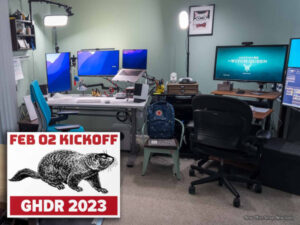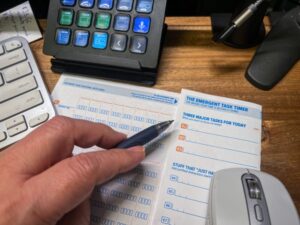(last edited on February 15, 2023 at 12:27 pm)
It’s time for my second Groundhog Day Resolutions review of the year!
It has been a difficult month in some respects. For example, my main goal for the month was to make significant progress on my video game project, but I lost steam over the last three weeks. Instead, I did a bunch of tasks that were related to my main goals for the year:
- I found a primary care physician and supporting laboratory by walking into some places and checking them out in person.
- I moved out tons of junk out of my house, preparing for reflooring the living room.
- I prepped for taxes
- I rebuilt web servers, websites, and workstations from scratch
- I attended a bunch of social events.
So while I got all that stuff done, why do I feel so unproductive? And why was I able to do one set of tedious tasks but not the other?
I’ve got some theories.
Analysis of Feeling Unproductive
If I were trying to make a show of how productive I was, I could easily just make a huge list of all the little things that got done. However, I have the memory of being unproductive each time I tried to engage the major goal of the month. And for all the other stuff I did—I even completely rewired my home network—it is the memory of having not-worked that is WAY stronger than what was done then forgotten. Weird.
The task I had trouble engasging was writing an “artificial intelligence” system so my game spaceships can fly around by themselves. This is code that I had written a couple times before, but for the second pass I wanted to make a much more comprehensive and elegant system. I have the shape of the plan in my head, and yet I wasn’t quite about to pull the trigger and start coding. Part of me just didn’t want to start.
I sat for a few minutes today and tried to put the negative feeling into words:
I was not excited about writing the AI code to begin with. It’s daunting and is guaranteed to be unrewarding and difficult until it starts to work. Even though I know that it WILL eventually work and be awesome, my visceral reaction is that it’s not a rewarding or fun task. Usually, when I am feeling rested or energized from external sources, I can tackle these kind of challenges and grind through them. However, I have not been feeling particularly rested of late. I strongly suspect this feeling of not being rested is a manifestation of not wanting to write the code, my inner baby squealing WAH WAH WAH I DON’T WANNA in a more age-appropriate way.
I still seem to have a kind of anxiety about time. I have written about this before, and it’s why “eliminating time-based thinking” is on my list this year. The past month has been full of schedule events, and when I have something I need to attend to EVERY DAY that seems to knock me off balance. I am far from mastering the technique of putting the future out of my mind so I can be fully in the present. I don’t want to be late or unprepared, and this constantly impinges on my consciousness as I try to work. And after each meeting, I seem to take a lot of time to pull my brain back together. I’m not sure if I’ve ever successfully done complicated work after having a meeting, other than write down all the notes in my head then shut down for the day. I have quite a lot of data from my productivity challenge that suggests that for every hour spent outside, I need about EIGHT hours to myself before I feel back to baseline-normal. It’s ridiculous, but that is what the data seems to suggest.
When I write code, I need a tremendous amount of solitude, and I feel I didn’t have enough of a block of time on many days I tackled the AI task unsuccessfully. With the number of social events this month and higher-than-normal slate of meetings, I was always a couple hours away from some kind of interruption. Knowing that interruption was coming made it difficult for me to focus on getting into the coding mindset. Knowing that I would have to stop also made me not want to start; it didn’t seem worth it, because of my belief that I needed the solitude in large quantities of time.
I thought about how I could be a more competent programmer. While I am pretty confident that I’m a decent programmer, I have the belief that full-tie programmers must be more productive. I try to put this thought out of my head, knowing intellectually that by gaining more experience through writing code is the only way to do it. The awareness of the gap between what I can do compared to a team of experienced game developers is a huge distraction. It burns up my energy unproductively, feeling less adequate.
I can summarize the above as the desire for immediate reward, the anxiety of disruptive time commitments, and depression of falling short. The general pattern group is interruptive thoughts about myself in relationship to (1) something I wanted but couldn’t have and (2) feeling I needed to put effort into external/social expectations and (3) feeling that I was not measuring up to my own expectations.
Interestingly, when it came to doing the other tasks, the feelings I had toward those tasks were more of irritation and chugging along until things worked. These tasks were also somewhat more ordinary, not requiring a lot of new learning from me, which made them less daunting. The big resistance wall arose only for the programming task, which ostensibly was the task I wanted to work on.
The obvious solution is either to NOT think those disruptive thoughts, or NOT have the triggering conditions for them. That would reduce the friction, but it’s hard to just NOT do something without something else to fill the void. I’ve tried both approaches before, and while they have had some short-term results, I still fall back into this pattern over and over again. Without any external reminders, it seems to be my nature (or perhaps human nature) to repeat those thought cycles.
I think I see a possible alternative approach by recognizing this pattern:
- When I was thinking about doing the programming work, I was very much focused on what I lacked and had to suffer to learn.
- For the other tasks, as tedious as I thought them to be, I was focused on acquiring data and useful assets.
In other words, my negative attitude toward programming the AI was centered around NOT having the experience, NOT having the state-of-the-art game development knowledge, NOT knowing what would pay off next, NOT knowing how much time I needed, and so on. By comparison, the chore-like tasks had many of the same NOTs, but I was focused on something else. I’m not sure exactly what it is, but it’s marked by thoughts about ACQUIRING instead of NOT HAVING.
I wonder if the solution is to catch which mindset I’m in and redirect the negative reactions from “half empty” to “half full”. Instead of thinking how much slower and less experienced I am compared to the profs who are working at top game studios, I really just need to think about acquiring what I need by counting what I need rather than what I can’t do. That’s the big insight that I’ll try testing for April.
Therapeutic Micro Projects
To encourage this way of thinking, I’m going to try a new challenge for this Groundhog Day Resolutions period, starting on April 5 and ending on May 5th. The challenge is a variation of my New Thing A Day. This time, I’m going to lower the bar further by making it a month of Micro Things – chores that are so small in scope that they challenge the notion of utility. I’d like to find out what makes the difference between a “small and simple” satisfying tasks taking around 15 minutes to do. I want to measure the amount of fulfillment and progression I feel by completing this smaller tasks. It should be an interesting experiment.
The Month Ahead
The same focus exists: AI programming, this time with “acquisition mindset” rather than “lacking mindset”. I also have to get notesbooks into production and finalize my taxes. I’ll know if I have the money to get the **living room floor redone*.
Thanks to the website problems of last month, I have a shiny new website to work with this month. Although it may not look that much different to the casual observer, there are a LOT of changes that will make it easier to showcase some of our work. I’d like to get away from the heavy analytical writing to a friendly conversational style. In other words, more short posts covering a broader range of interests.
So that’s where I am today. I’m posting this a bit late. It’s been a real struggle to work through today’s post, looking for the patterns and rewriting the post. Ugh.
Groundhog Day Resolution Posts for 2015
Here are other posts about Groundhog Day Resolutions for the 2015 season.- The original post about Groundhog Day Resolutions
- 02/02 - Kickoff - Setting Goals
- 03/03 - Resolution Review #1: ETP Notebooks, Video Games, and Living Room Cafes
- 04/04 - Resolution Review #2: Acquisition Mindset, Micro Thing Challenge
- 05/05 - Resolution Review #3: Releasing Expectations for Better Productivity?
- 06/06 - Resolution Review #4: Embracing Structured Productivity
- 07/07 - Resolution Review #5: Floor Installation and Dad Visitation
- 08/08 - Resolution Review #6: Embracing Slowness (or at least tolerating it)
- 09/09 - Resolution Review #7: A Month of Slow Movements
- 10/10 - Resolution Review #8: Making Bacon and Plowing Through
- 11/11 - Resolution Review #9: An Economy of Giving
- 12/12 - Resolution Review #10: Finding Certainty





0 Comments